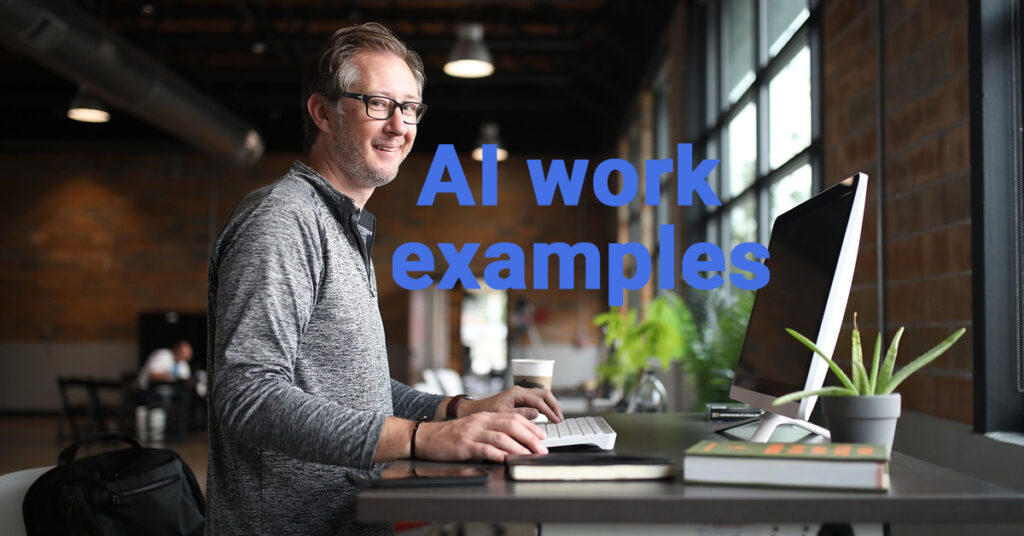AI Work Examples: How Artificial Intelligence Is Transforming Everyday Life and Business

Introduction: The Era of Intelligent Technology
We are living in an age where Artificial Intelligence (AI) is no longer just a concept—it’s a reality shaping every part of our world. From the smartphones we use to the companies we work for, AI is silently working behind the scenes, making decisions, solving problems, and predicting outcomes faster than ever before.
Whether you realize it or not, AI plays a vital role in your daily routine—when Netflix recommends your next show, when Google Maps predicts your fastest route, or when a chatbot instantly answers your questions online.
In this blog, we’ll explore real-world AI work examples, how AI in business and daily life is changing the game, and what the future of AI technology holds for all of us.
Artificial Intelligence in Daily Life
Artificial Intelligence has become deeply integrated into our personal lives. We interact with it countless times a day without even noticing.
For example:
-
Voice Assistants: Siri, Alexa, and Google Assistant use AI to understand speech, process natural language, and respond intelligently.
-
Smart Recommendations: Netflix, YouTube, and Spotify rely on AI algorithms to suggest content based on your viewing or listening history.
-
Smart Homes: Devices like smart thermostats, lights, and cameras learn your habits and automate tasks to improve comfort and security.
-
Social Media Feeds: Platforms like Facebook, Instagram, and TikTok use AI to personalize your feed, showing you content that keeps you engaged.
AI in daily life isn’t just about convenience—it’s about creating personalized experiences that make technology feel more human.
AI in Business: A Revolution in Productivity and Decision-Making
In the corporate world, AI in business is driving an industrial transformation. From startups to global corporations, AI tools are helping leaders make smarter, data-driven decisions.
Key AI business applications include:
-
Customer Service Automation: Chatbots and AI-powered virtual agents handle thousands of queries instantly, reducing the need for human intervention.
-
Predictive Analytics: Businesses use AI to forecast demand, detect trends, and identify risks long before they happen.
-
Marketing Optimization: AI analyzes consumer behavior, enabling companies to deliver highly targeted ads and personalized campaigns.
-
Human Resources: AI systems can scan resumes, identify top talent, and even analyze employee performance patterns.
By combining AI automation tools with human creativity, businesses are reaching new levels of efficiency and profitability.
Machine Learning Applications: The Core of AI
At the heart of AI lies Machine Learning (ML)—the ability for computers to learn from data and improve over time without explicit programming.
Some powerful examples of ML applications include:
-
Email Spam Filters: AI models learn what messages are spam and automatically block them.
-
Fraud Detection: Financial institutions use ML to detect unusual transactions in real time.
-
Image and Voice Recognition: From Face ID on phones to automated transcription tools, ML powers many modern conveniences.
-
Recommendation Engines: ML algorithms analyze your interests to suggest products, movies, or even friends online.
Machine Learning enables systems to adapt, evolve, and improve, making AI smarter every day.
AI Automation Tools: Working Smarter, Not Harder
AI automation tools are transforming how work gets done across industries. They eliminate repetitive tasks, freeing employees to focus on creativity and strategy.
Here are some major areas where automation shines:
-
Data Entry & Processing: AI tools can analyze and categorize massive amounts of data within seconds.
-
Email & Workflow Automation: Platforms like Zapier and HubSpot use AI to streamline workflows.
-
Manufacturing Robots: AI-powered robots ensure precision, safety, and consistency in industrial operations.
-
Content Creation: Generative AI tools like ChatGPT and Jasper help businesses create blogs, ads, and marketing copy efficiently.
This new era of automation doesn’t replace humans—it enhances human potential, allowing people to achieve more in less time.
AI in Healthcare: Saving Lives with Data and Intelligence
Perhaps one of the most inspiring uses of AI lies in healthcare. By analyzing medical data, AI helps doctors detect diseases earlier and improve patient outcomes.
Notable AI healthcare applications include:
-
Medical Imaging: AI scans X-rays and MRIs to spot conditions like tumors and fractures.
-
Drug Discovery: AI speeds up the search for new treatments and vaccines.
-
Virtual Health Assistants: Chatbots help patients manage medication schedules and appointments.
-
Predictive Health Analytics: AI models can forecast potential health risks before symptoms even appear.
AI in healthcare represents a life-saving partnership between technology and medicine.

Future of AI Technology: What’s Next?
The future of AI technology is both exciting and unpredictable. As algorithms become more sophisticated, we’ll see AI move beyond automation into creative and emotional intelligence.
Upcoming trends include:
-
AI-Powered Creativity: AI will generate music, art, and film scripts that rival human imagination.
-
Ethical AI: New standards will ensure AI remains fair, transparent, and unbiased.
-
Human-AI Collaboration: Instead of replacing jobs, AI will redefine them—creating smarter work environments.
-
Quantum AI: Quantum computing will allow AI to process complex problems in seconds.
In short, the future belongs to those who understand, embrace, and innovate with AI.
? Frequently Asked Questions (FAQs)
1. What are some common examples of AI in daily life?
AI is used in voice assistants, recommendation systems, online shopping, and smart home devices.
2. How is AI changing the business world?
AI helps companies automate tasks, predict customer behavior, and make data-driven decisions faster.
3. What role does machine learning play in AI?
Machine learning is the foundation that allows AI systems to learn and improve automatically through data.
4. Can AI replace human jobs completely?
Not entirely—AI automates routine tasks but still requires human creativity, emotion, and decision-making.
5. How is AI helping in healthcare?
AI assists doctors with early disease detection, medical imaging, and personalized treatment planning.
6. What will the future of AI technology look like?
The future will see more ethical, creative, and collaborative forms of AI working alongside humans.
7. Is AI safe for everyday use?
Yes—when properly regulated and used responsibly, AI makes life easier, faster, and more efficient.
Conclusion
Artificial Intelligence is not just about robots or complex algorithms—it’s about creating smarter ways to live and work. From daily conveniences to life-saving innovations, AI continues to redefine the boundaries of what technology can achieve. As we move forward, one thing is certain: the more we understand AI, the better we can use it to build a brighter, more connected future.
